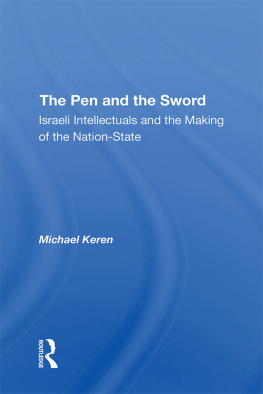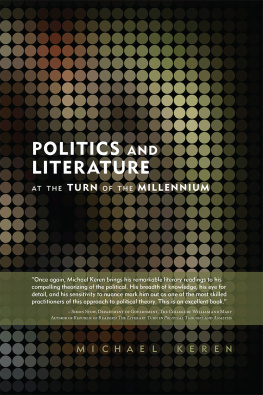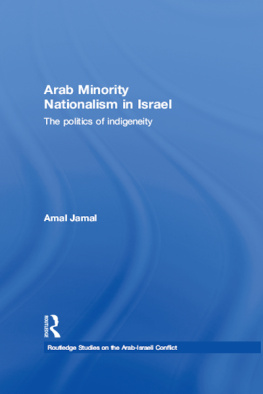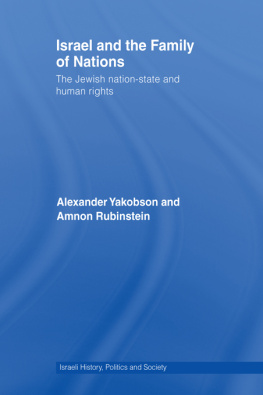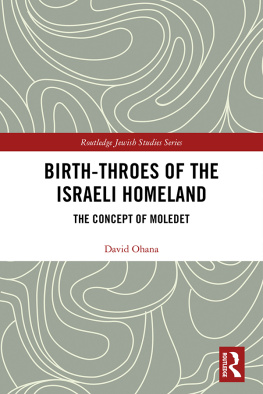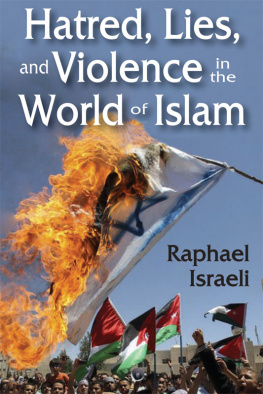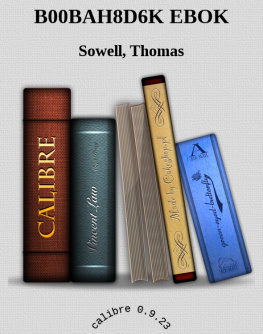First published 1989 by Westview Press, Inc.
Published 2019 by Routledge
52 Vanderbilt Avenue, New York, NY 10017
2 Park Square, Milton Park, Abingdon, Oxon OX14 4RN
Routledge is an imprint of the Taylor & Francis Group, an informa business
Copyright 1989 Taylor & Francis
All rights reserved. No part of this book may be reprinted or reproduced or utilised in any form or by any electronic, mechanical, or other means, now known or hereafter invented, including photocopying and recording, or in any information storage or retrieval system, without permission in writing from the publishers.
Notice:
Product or corporate names may be trademarks or registered trademarks, and are used only for identification and explanation without intent to infringe.
Library of Congress Cataloging-in-Publication Data
Keren, Michael.
The pen and the sword: Israeli intellectuals and the making of the nation-state/Michael Keren.
p. cm.
Includes index.
ISBN 0-8133-0633-7
1. IsraelPolitics and government. 2. IntellectualsIsrael
Political activity. 3. IsraelIntellectual life. 4. Politics and
cultureIsrael. 5. ZionismHistory. I. Title.
DS126.5.K46 1989
956.94dc19 89-30917
CIP
ISBN 13: 978-0-367-29470-0 (hbk)
Chapter One
Intellectuals and the State
Nationalism, wrote George Steiner, is the venom of our age. It brought Europe to the edge of ruin, it drives the states of Asia and Africa like crazed lemmings, it leads us all to self-destruction. The earth grows too crowded to waste soil on barbed wire. This is why Steiner, an English-Jewish literary critic living in Switzerland, decided not to move to Israel. Israel had to make itself a closed fist, he claimed. No one is more tense with national feelings than an Israeli. Israel is a nation-state to the utmost degree; it lives armed to the teeth and its virtues are those of beleaguered Sparta.
Steiner added that these virtues are alien to the most radical, humane elements of the Jewish spirit. The Jewish spirit, as he saw it, is manifested in the critical humanism of the scholar. To preserve it, he thus had to "stay in the cold, outside the sanctuary of nationalism."
This argument reflects a point of view that has prevailed in Jewish intellectual life since the "enlightenment" of the late eighteenth century. The enlightenment movement, associated mainly with the German-Jewish reformer Moses Mendelssohn (1729-1786),and non-Jewish, called upon the Jews to adapt to the cultural patterns of their non-Jewish environment.
Encouraged by political conditions supporting the cause of reason (such as the Edict of Tolerance issued in Austria in 1781, which granted Jewish children a certain measure of secular education), Jewish intellectuals ventured to prepare the cultural and educational background necessary for emancipation. Mendelssohn himself translated the Pentateuch into German in order to introduce students to the language of their enlightened neighbors and edge out Yiddish, the language hitherto in use. A Hebrew periodical entitled Hame'assef, first published in Konigsberg in 1784, was dedicated to the ideas of enlightenment that spread throughout Europe. Scholars minimized elements of Judaism believed to be a hindrance to emancipation, such as the messianic idea, and educators launched educational establishments devoted to the philosophy that Jewish tradition was not the exclusive source of the values upon which the new generation of Jews should be nourished.
After the Napoleonic Wars, as many Jews in central and western Europe emerged from the ghetto and sought emancipation in their countries of residence, the Jewish intellectual was credited as the avant-garde of emancipation. This was so because the Jews' hopes for equal rights depended on an alignment with the enlightened in the Christian community, and the intellectuals provided that link. Although after the restoration of 1815 the future no longer seemed to lie with reason but with romantic nationalism, the association between emancipation and enlightenment was maintained. Jewish hopes for integration in the social order resided in liberal movements composed of the middle class intelligentsia fighting for the reshuffling of that order. Thus, Jewish intellectuals were abundantly represented in European liberal movements as well as in many movements perceived to be devoted to enlightened causes ever since.
Toward the end of the nineteenth century, some Jewish intellectuals, disenchanted with the chances for emancipation in an age of growing nationalism and having learned that antisemitism had not diminished among the "enlightened," turned to the national idea and established the Jewish national movement known as "Zionism."
Most Jewish intellectuals, however, perceived the association of the intellectual with nationalism as heretical as the association with the ghetto tradition. The enlightened Jewish intellectual was expected to maintain his position "on the borderline of various civilizations,"
This point of view became famous in 1928 when Julien Benda, a French-Jewish intellectual, published The Betrayal of the Intellectuals, a strong objection to the association between intellect and nationalism. "Whatever their motives may have been," Benda wrote, "the great minds or the minds reputed such, by relating the whole of their value so noisily to their nation, have laboured in a direction contrary to that expected of them." Benda's expectation of the intellectuals was that they engage in activity with a disinterested attitudenot bring their political passions into their work, as the modern intellectuals had. One of Benda's examples of this "betrayal" was Jewish nationalism. He wrote that in the past, when the Jews were accused in various countries of keeping to themselves and not assimilating, they responded by denying it. Now they assert this clannishness and even take pride in it.
Benda's accusations against the modern intellectual were largely addressed to his fellow Jewish intellectuals who had chosen the path of Zionism. Zionist intellectuals were indeed convinced, as Benda put it, "that their thought cannot be good, that it cannot bear good fruit, unless they remain on their native soil, unless they are not 'uprooted.' "
Eliahu Tscherikower showed how in the mid-nineteenth century the refusal of the Russian Jewish intelligentsia to align with the needs and desires of the oppressed Jewish community under Czar Nicholas I (1825-1855) led to its total failure to assess reality. The intellectuals betrayed not only the Jewish masses but their own role as well, failing to apply critical thinking to the horrors of one of the darkest regimes in history. Their own self-interest as a tiny class of intellectuals facing a large and hostile orthodox community forced them to blindly consider the reactionary reign of the czar as "enlightened despotism" and drove them to support the government in its oppression of Jewish orthodoxy.

